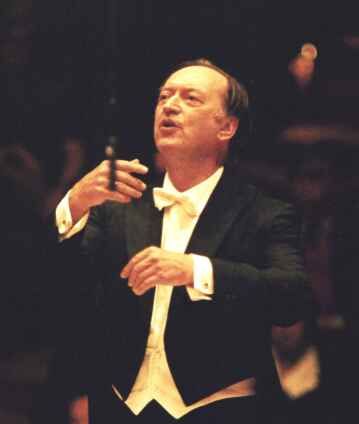Nikolaus Harnoncourt conducts Brahms

“Art isn’t a pretty accessory – it’s the umbilical cord that connects us with the divine. It insures our humanity ”, is how Nikolaus Harnoncourt described his view of music in 1991. This sincerity as well as an unabashed humanity is palpable in his performances with the Berliner Philharmoniker – as in this concert, which was dedicated entirely to the music of Johannes Brahms. The Academic Festival Overture and the Variations on a Theme by Joseph Haydn were followed by the First Symphony.
Nikolaus Harnoncourt became a figurehead of historical performance practice in the 1960s. He also worked closely with the Berliner Philharmoniker. Contrary to what might have been expected, the focus was not on Baroque music, but on the First Viennese School and music of the Romantic period. This concert took place in the run-up to the joint CD recordings of Johannes Brahms’s symphonies, overtures and orchestral variations.
Brahms’s Academic Festival Overture offers a whimsical, but thoroughly artful contrapuntal potpourri of student songs, which the Hamburg composer wrote as a thank-you after being awarded an honorary doctorate by the University of Breslau in 1879. At first glance, the Variations on a Theme by Joseph Haydn may also seem like a simple compositional exercise. However, the structure of the chorale theme – it is doubtful that it was actually written by Joseph Haydn – consisting of two five-bar segments is unusual. In his variations, Brahms plays on this irregularity to great effect. It also informs the passacaglia finale, whose repeating bass also takes up the five-bar structure before the chorale shines once again in its entirety at the end.
The programme concludes with the darkly energetic First Symphony, which was the result of a long compositional process fraught with high expectations and self-doubt. “You have no idea what it’s like to hear such a giant marching behind you,” Brahms complained to his friend Hermann Levi, referring to Ludwig van Beethoven. Ultimately, Brahms squared the circle with his first work in the genre: conservative progress. The developing variation is a pioneering technique in which musical ideas grow organically beyond conventional thematic dualism. Harnoncourt’s performance also makes it clear that he is not only looking back to tradition, but above all forward to the future.
© 1996 NHK
Artists
Our recommendations
- A Beethoven evening with Nikolaus Harnoncourt
- Nikolaus Harnoncourt conducts Haydn’s “Orlando paladino”
- Daniel Barenboim and Yefim Bronfman perform Brahms’s Piano Concerto No. 1
- Gustavo Dudamel conducts “Also sprach Zarathustra”
- Paavo Järvi conducts Brahms and Lutosławski
- Sir Simon Rattle and the Orchestra Academy perform Mahler’s “Das Lied von der Erde”